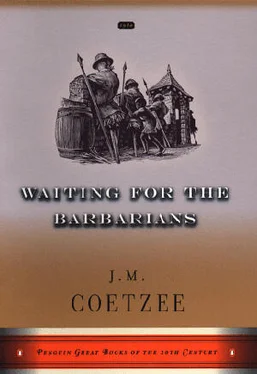The clamour outside dies down, but no one returns. The air is stale, drowsy. I would like to sleep, yet I am disturbed by the resonance of that soft impact on me in the road. Like a bruise my flesh retains the imprint of the body that for a few seconds rested against me. I fear what I am capable of: of coming back tomorrow in daylight still aching with the memory and asking questions until I discover who it was who ran into me in the dark, so as to build upon her, child or woman, an even more ridiculous erotic adventure. There is no limit to the foolishness of men of my age. Our only excuse is that we leave no mark of our own on the girls who pass through our hands: our convoluted desires, our ritualized lovemaking, our elephantine ecstasies are soon forgotten, they shrug off our clumsy dance as they drive straight as arrows into the arms of the men whose children they will bear, the young and vigorous and direct. Our loving leaves no mark. Whom will that other girl with the blind face remember: me with my silk robe and my dim lights and my perfumes and oils and my unhappy pleasures, or that other cold man with the mask over his eyes who gave the orders and pondered the sounds of her intimate pain? Whose was the last face she saw plainly on this earth but the face behind the glowing iron? Though I cringe with shame, even here and now, I must ask myself whether, when I lay head to foot with her, fondling and kissing those broken ankles, I was not in my heart of hearts regretting that I could not engrave myself on her as deeply. However kindly she may be treated by her own people, she will never be courted and married in the normal way: she is marked for life as the property of a stranger, and no one will approach her save in the spirit of lugubrious sensual pity that she detected and rejected in me. No wonder she fell asleep so often, no wonder she was happier peeling vegetables than in my bed! From the moment my steps paused and I stood before her at the barracks gate she must have felt a miasma of deceit closing about her: envy, pity, cruelty all masquerading as desire. And in my lovemaking not impulse but the laborious denial of impulse! I remember her sober smile. From the very first she knew me for a false seducer. She listened to me, then she listened to her heart, and rightly she acted in accord with her heart. If only she had found the words to tell me! "That is not how you do it," she should have said, stopping me in the act. "If you want to learn how to do it, ask your friend with the black eyes." Then she should have continued, so as not to leave me without hope: "But if you want to love me you will have to turn your back on him and learn your lesson elsewhere." If she had told me then, if I had understood her, if I had been in a position to understand her, if I had believed her, if I had been in a position to believe her, I might have saved myself from a year of confused and futile gestures of expiation.
For I was not, as I liked to think, the indulgent pleasure-loving opposite of the cold rigid Colonel. I was the lie that Empire tells itself when times are easy, he the truth that Empire tells when harsh winds blow. Two sides of imperial rule, no more, no less. But I temporized, I looked around this obscure frontier, this little backwater with its dusty summers and its cartloads of apricots and its long siestas and its shiftless garrison and the waterbirds flying in and flying out year after year to and from the dazzling waveless sheet of the lake, and I said to myself, "Be patient, one of these days he will go away, one of these days quiet will return: then our siestas will grow longer and our swords rustier, the watchman will sneak down from his tower to spend the night with his wife, the mortar will crumble till lizards nest between the bricks and owls fly out of the belfry, and the line that marks the frontier on the maps of Empire will grow hazy and obscure till we are blessedly forgotten." Thus I seduced myself, taking one of the many wrong turnings I have taken on a road that looks true but has delivered me into the heart of a labyrinth.
In the dream I am advancing towards her over the snow-covered square. At first I walk. Then as the wind gathers force I begin to be driven forward in a cloud of whirling snow, with arms extended on either side and the wind catching my cloak like a boatsail. Gathering speed, my feet skimming over the ground, I swoop down upon the solitary figure at the centre of the square. "She will not turn and see me in time!" I think. I open my mouth to cry out a warning. A thin wail comes to my ears, whipped away by the wind, borne up into the sky like a scrap of paper. I am almost upon her, I am already tensing myself for the impact, when she turns and sees me. For an instant I have a vision of her face, the face of a child, glowing, healthy, smiling on me without alarm, before we collide. Her head strikes me in the belly; then I am gone, carried by the wind. The bump is as faint as the stroke of a moth. I am flooded with relief. "Then I need not have been anxious after all!" I think. I try to look back, but all is lost from sight in the whiteness of the snow.
My mouth is covered in wet kisses. I spit, shake my head, open my eyes. The dog that has been licking my face backs off wagging its tail. Light seeps through the doorway of the hut. I crawl out into the dawn. Sky and water are tinged with the same rosiness. The lake, where I have grown used to seeing every morning the blunt-prowed fishing-boats, is empty. The camp where I stand is empty too.
I wrap myself tighter in my cloak and walk up the road past the main gate, which is still closed, as far as the north-west watchtower, which does not appear to be manned; then back down the road and, cutting across the fields, over the earthwall towards the lakeside.
A hare starts at my feet and dashes away in a zigzag. I keep track of it until it has circled back and is lost behind the ripe wheat in the far fields.
A little boy stands in the middle of the path fifty yards from me, peeing. He watches the arc of his urine, watching me too out of the corner of his eye, curving his back to make the last spurt go further. Then with his golden trail still hanging in the air he is suddenly gone, snatched away by a dark arm from the reeds.
I stand on the spot where he stood. There is nothing to be seen but tossing reed-crests through which flickers the dazzling half-globe of the sun.
"You can come out," I say, barely raising my voice. "There is nothing to be afraid of." The finches, I notice, are avoiding this patch of reeds. I have no doubt that thirty pairs of ears hear me.
I turn back to the town.
The gates are open. Soldiers, heavily armed, poke around among the huts of the fisherfolk. The dog that awoke me trots with them from hut to hut, tail high, tongue lolling, ears alert.
One of the soldiers heaves at the rack where the gutted and salted fish hang to dry. It comes creaking down.
"Don't do that!" I call, hurrying my steps. Some of these men I recognize from the long days of torment in the barracks yard. "Don't do it, it wasn't their fault!"
With deliberate nonchalance the same soldier now strolls over to the largest of the huts, braces himself against two of the projecting roof-struts, and tries to lift the thatched roof off. Though he strains he cannot do it. I have watched these fragile-seeming huts being built. They are built to withstand the tugging of winds in which no bird can fly. The roof frame is lashed to the uprights with thongs that pass through wedge-shaped notches. One cannot lift it without cutting the thongs.
I plead with the man. "Let me tell you what happened last night. I was walking past in the dark and the dogs began to bark. The people here were frightened, they lost their heads, you know how they are. They probably thought the barbarians had come. They ran away down to the lake. They are hiding in the reeds-I saw them a short while ago. You can't punish them for such a ridiculous incident."
Читать дальше












